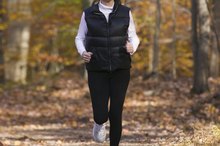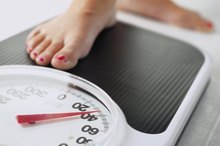How to Jump-Start Your Metabolism While in Menopause
Menopause, the stage in a woman's life when her monthly periods stop, usually around age 50, is a time of change. For many women, one of those changes is hormonal- and age-related weight gain, especially in the abdomen, which increases the risk of diabetes, high blood pressure, heart disease and some types of cancer. Jump-start your metabolism in menopause with targeted changes to your diet and exercise routine.
Engage in regular strength training. Resting metabolic rate, or the rate at which you burn calories, declines each year with the normal loss of muscle tissue that occurs as you get older. Counteract this trend by participating in regular strength training to preserve or build your muscle mass and burn more calories.
How to Lose Weight During Perimenopause
Learn More
Aim for 30 minutes of aerobic exercise most days. Aerobic exercise, such as brisk walking or using a rowing or elliptical machine, burns calories and can help you manage your weight. Dress in layers and drink plenty of water to avoid dehydration from hot flashes that may occur during exercise.
Eat less. However, don't eat less than 1,200 calories per day. During your 50s, you need about 200 fewer calories each day than in your 30s or 40s. Choose nutrient-dense foods, which are rich in nutrients relative to calories, so you still get adequate nutrition. Eat an apple instead of pretzels, a potato instead of chips, extra veggies instead of a dinner roll and whole wheat bread instead of white. Don't reduce your calories below 1200, because extreme calorie-cutting can slow down your metabolism considerably.
A Healthy Way to Drop 15 Pounds in 50 Days
Learn More
Consume fiber-rich foods. Foods high in fiber, such as fruits, vegetables, whole grains and legumes, are relatively low in calories and high in volume, and take longer to eat. A high-fiber meal fills you up and curbs your appetite, which may help you maintain or lose weight.
Eat lean protein. Protein takes more effort for your body to digest, which adds up to more calories burned. Aim to get 16 to 20 percent of your calories from lean protein each day from foods such as skinless chicken and turkey, fish, low-fat dairy products and legumes.
Warnings
Consult your doctor before starting any exercise program.
Related Articles
References
- IDEA Health and Fitness Association; Working Out Through Menopause; February 2002
- Cleveland Clinic: Menopause: Staying Healthy Through Good Nutrition
- American Heart Association; Fiber Up, Slim Down; February 9, 2011
- Jakici, John M., et al. Effect of Exercise on 24-Month Weight Loss Maintenance in Overweight Women. Arch Intern Med. 2008;168(14):1550-1559.
- Jakicic, John M., et al. "Appropriate Intervention Strategies for Weight Loss and Prevention of Weight Regain for Adults." ACSM Position Stand. Medicine & Science in Sports & Exercise, 2001.
- LaForge, Ralph. "Exercise Determinants of Weight Loss." ACE Certified News, Aug/Sept 2006, 3-6.
Resources
Writer Bio
Gianna Rose is a registered nurse certified in hospice and palliative care, as well as a certified wellness coach. She completed Duke Integrative Medicine's Mindfulness-Based Stress Reduction course in 2009. Rose also holds a Bachelor of Fine Arts from the Savannah College of Art and Design.









